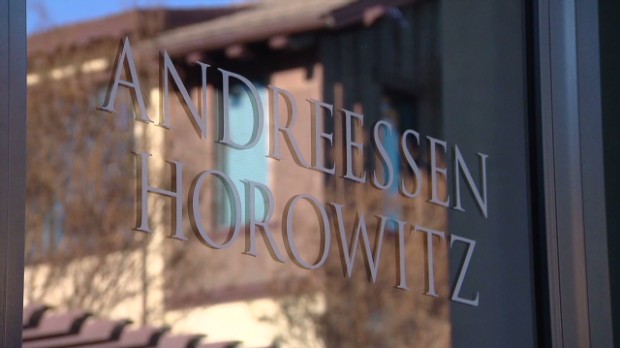The Sand Hill Road venture firm Andreessen Horowitz is in the thick of fundraising and talking with investors about a fresh $1.5 billion fund, according to several sources who note the fund could always close at a higher number.
It was almost exactly two years ago that the firm closed its forth, multi-stage venture capital fund, Andreessen Horowitz Fund IV, with $1.5 billion.
The money also comes on the heels of a $200 million fund that the firm announced in November called the AH Bio Fund, a vehicle that’s being used to invest in mostly early-stage startups at the intersection of computer science and life sciences.
Altogether, Andreessen Horowitz, which launched in June 2009, has so far raised $4.35 billion, including three previous funds.
The firm declined to comment for this story, but it’s easy to imagine that even Andreessen Horowitz – considered one of the top venture firms in the world — isn’t finding fundraising quite as easy as it has in the past given uncertainty in the broader market.
Though it will undoubtedly reach its target, the young firm is looking for capital at a time when its own investors may not be feeling terribly flush.
As Chris Douvos, a limited partner with Venture Investment Associates, recently told us, “LPs are definitely yelling at VCs to put some ‘moolah in the coolah.’” Institutional funds “give out money [to VCs] expecting it will come back with profits in a reasonable amount of time,” said Douvos. “When it doesn’t, we can’t put more money into the asset class because a.) we’re at the top of our allocation [to venture capital and b.) we’re out of money.”
Indeed, the firm looks to have spent recent months preparing to woo investors, including by liquidating part of its stake in the car-sharing company Lyft in December.
As the WSJ reported earlier this month, both Andreessen Horowitz and early Lyft backer Founders Fund sold some of their shares to Saudi Arabia’s Prince al-Waleed bin Talal and his Kingdom Holding Co. (Taking money off the table and making distributions to LPs is a decision their fellow investor Fred Wilson recently argued more venture firms should be doing more frequently.)
Andreessen Horowitz has also been shifting its staff around quite a bit. It marked its big move into biotech not just with that $200 million fund but by bringing aboard longtime Stanford professor Vijay Pande as a new general partner.
The company also hired TrialPay cofounder Alex Rampell last summer as a general partner. And last week, it brought aboard a ninth general partner in Martin Casado, the cofounder and CTO of Nicira, a software defined networking company. (Nicira was an early bet for Andreessen Horowitz and ranks among its biggest exits to date.)
Meanwhile, general partner — and IronPort Systems cofounder — Scott Weiss announced last month that he will no longer be investing in new companies on behalf of Andreessen Horowitz. (Weiss said he wanted to spend more time with his family.)
Despite its maneuverings, Andreessen Horowitz could be caught a bit flat-footed by a market turned rocky. Though it has seen many of its investments marked up wildly over time, much of that appreciation remains on paper, as at other firms.
Andreessen Horowitz led a $25 million round late 2013 round in the bitcoin exchange Coinbase, for example. The company’s valuation wasn’t revealed at the time, but in January of 2015, DFJ led a $75 million growth round in the company, presumably providing a nice mark-up for Andreessen Horowitz in the process. (The company, which isn’t quite four years old, remains privately held.)
In 2012, Andreessen Horowitz also led a $100 million Series A round in Github, the now-eight-year-old, San Francisco-based online repository for software code. The deal was done at a reported $750 million valuation. Last summer, still-private Github raised $250 million led by Sequoia Capital at a reported $2 billion valuation.
Like its peers, Andreessen Horowitz has also made some bets on companies whose trajectory once moved in a straight upward line and have since encountered slowing growth and, in one case, even bigger problems.
The firm led two rounds in the location-based tech company Foursquare, for example, leading Foursquare’s $20 million Series B and its $50 million Series C round at a valuation of roughly $640 million. But Foursquare, which announced another $45 million in funding last month, saw its valuation halved in the deal.
Andreessen Horowitz also led two separate rounds of funding for the human resources software company Zenefits in 2014. TechCrunch reported at the time that the company had a pre-money valuation of $500 million, which suggests Andreessen Horowitz may still do well by the company.
That bet looks less certain than it once did, however. Though Zenefits went on to obtain a $4.5 billion valuation, things have famously gone very wrong since. (New CEO David Sacks is busily trying to restore confidence in the company, including resorting to an admittedly funny joke on Twitter yesterday about Zenefits’ formerly freewheeling culture.)
Even a turnaround at Zenefits won’t be enough for one top LP, who told us privately this week that Andreessen Horowitz is the “poster child for valuation insensitivity,” and called the firm’s move into healthcare a “real sign of desperation.”
Of course, the high-profile firm has always had its share of detractors as well as adherents. We’d hazard a guess that plenty of other investors are clambering to get into the firm’s newest fund before the door shuts.
Said another LP who talked with us about the firm and some of its recent transitions: “They have such a large organization that it necessarily has to be a little hierarchical in terms of how much deal process you lead and how much autonomy you can enjoy.”
Andreessen will probably “always have some [staffing] changes, because there are a lot of talented people there who have a lot of options.”
Additional reporting by Matthew Lynley.
